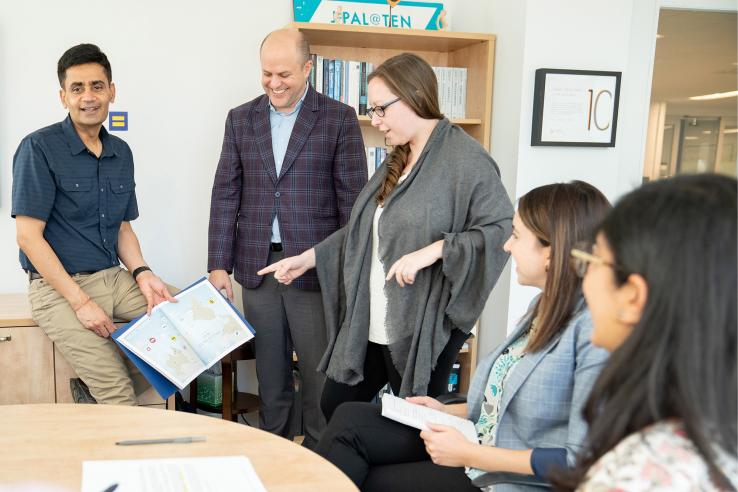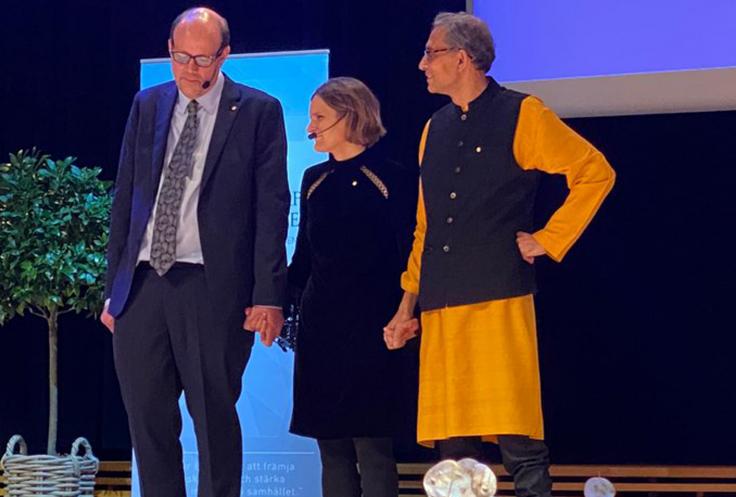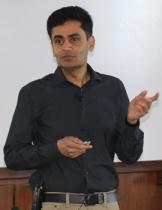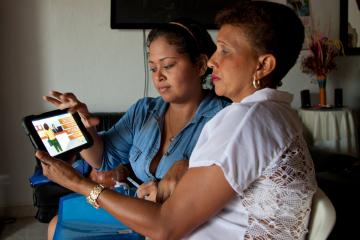
Doubling down to build on an incredible 2019

2019 was a banner year for J-PAL on many fronts. We launched many exciting initiatives to expand the frontiers of research and evidence-informed policy, including in digital finance (Africa), government innovation (global), migrants and social inclusion (Europe), work of the future (North America), Teaching at the Right Level (Africa), and use of administrative data for faster, cheaper randomized evaluations (global).
Our existing research initiatives contributed funding to help launch 56 new randomized evaluations that test the most effective approaches to fighting poverty. We grew our online MicroMasters program and admitted the first class of students in our new Master’s in Data, Economics, and Development Policy at MIT. And we welcomed 20 top researchers to our affiliate network, while growing our talented team of research, policy, training, and operations staff worldwide.
2019 was also notable for an exceptional reason: J-PAL co-founders Abhijit Banerjee and Esther Duflo and our longtime affiliate Michael Kremer were awarded the 2019 Nobel Prize in Economics for their experimental approach to alleviating global poverty.
In the midst of all the pomp and ceremony of the Nobel Week in Stockholm, it was incredibly humbling to witness the laureates donate their entire prize money to fund the next generation of researchers. And so inspiring to hear Abhijit in his Nobel lecture describe how the collective research of our brilliant affiliates helped establish the role of experiments in development economics, to see Michael in his lecture draw the link between research and innovation that is helping make a positive change for tens of millions of people worldwide, and to applaud Esther at the grand Nobel Banquet as she concluded the formal festivities with the impromptu exhortation, “There is a lot of work left to do to fight poverty and climate change—we better get back to it!”
But perhaps the most moving was to see the three of them standing hand-in-hand, accepting the congratulations on behalf of the movement. (Missed their Nobel lectures? Watch them here!)

Nobel laureates Michael Kremer, Esther Duflo, and Abhijit Banerjee on the Nobel stage in Stockholm in December 2019. Photo: Iqbal Dhaliwal | J-PAL
It will be tough to top this Nobel year, but we’re excited to be moving full steam ahead! We’re doubling down on the hard work and strong, collaborative partnerships that helped this movement grow and succeed.
In 2020, we’ll work to generate cutting-edge research and innovative solutions to key priority issues like climate change, labor, migration and refugees, social protection, taxation, and urban services. We will conduct policy outreach so more decisions are grounded in evidence, and provide technical support to help scale up effective programs to reach millions more people experiencing poverty. We will refocus our efforts to build the capacity of local researchers and policymakers, leveraging our experience creating online courses and innovative learning settings like “flipped” classrooms. We will continue our efforts to deepen our existing funding and field partnerships, and work hard to build new partnerships to help make this movement even more innovative, equitable, and impactful.
Throughout it all, we’ll strive to be nimble, be effective stewards of our donors’ resources, keep our partners’ and policymakers’ needs at the forefront, and push forward an evidence-based approach to fighting poverty around the world.
A huge thank you to our affiliated researchers, staff, funders, and field partners who have been part of this two-decade-long journey, and to those who have followed along and supported us in every way. And we are so very grateful to the millions of participants in thousands of studies, without whom none of this would be possible.
More than 400 million people have been reached by scale-ups of programs evaluated by J-PAL affiliates, but there are hundreds of millions more not yet reached. So as we launch into a new decade, and the next chapter in J-PAL’s evolution, please join us: subscribe to our newsletters, support our work, enroll in a training course, explore our research, policy insights, and scale-ups, follow us on Twitter, or get in touch with us to explore ways for us to collaborate.
Stay tuned for more from J-PAL as the year progresses—we do indeed have lots of work to do, and we cannot do it alone.
Happy new decade!



